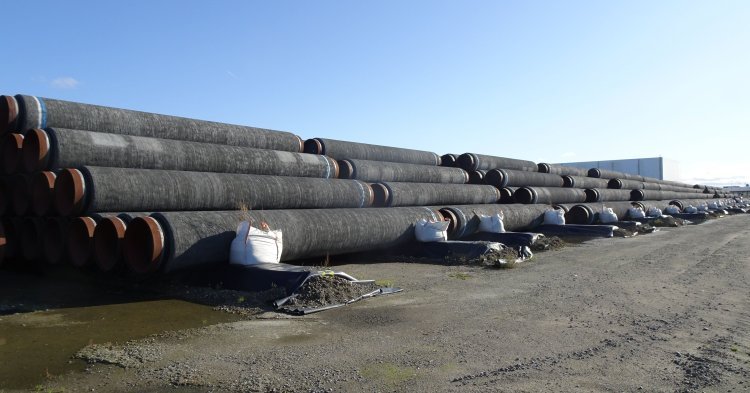According to this political logic, the creation of a gas hub in the Mediterranean region, and therefore south of the European continent, seems to be one of the main objectives pursued within the broader project of energy diversification. In particular, a series of discoveries since the early 2000s have highlighted the great potential for gas extraction in the eastern Mediterranean. The Levantine Basin, which stretches across an area of about 80,000 square kilometres and covers the territorial waters of several states, has recently become the centre of substantial energy exploration. The positive results of such explorations have confirmed the unique opportunity offered by this new extraction area.
In fact, considering the geographical location of the Levantine Basin, as well as the States involved, the consolidation of new commercial dynamics could potentially achieve numerous objectives. While European countries would be offered significant alternatives for the diversification of supply routes, it is also worth highlighting the potential advantages created through regional cooperation within the energy sector. For example, an intergovernmental approach to exports could offer Eastern Mediterranean States an important and invaluable support in the management of tensions and conflicts. This support would thus contribute to the development of cooperative dynamics and mutual interest between parties, and therefore influence the geopolitical and economic relations currently in place. 1
The exploration of gas reserves in the Levantine Basin is still ongoing, and is being driven by the Italian Energy company Eni. However, the area has been receiving attention from various companies for some years now, especially following the discoveries made in the territorial waters of Israel, Cyprus and Egypt. Due to the size of their reserves and their infrastructure, these countries have been recognised as the main players in this new Mediterranean energy project.
The first most significant discovery dates back to January 2009, when the Texan company, Noble Energy, identified the Tamar natural gas field. By re-entering the Israeli Exclusive Economic Zone (EEZ) and the more extensive Leviathan gas field, Noble Energy has been able to significantly change its role in the energy sector, repositioning itself as an exporter of natural gas, after having been a long-term net importer.
In 2011, about 30 kilometres north-west of the Tamar natural gas field, Noble Energy made yet another significant discovery, this time within Block 12 of the Cypriot EEZ. In fact, the Aphrodite field is located along the border between the Exclusive Economic Zones of Cyprus and Israel, although most of it is found on the Cypriot side. In light of this, it should come as no surprise that there was a dispute between the two parties over the exploitation of energy sources in the gas field, despite having signed an agreement on the demarcation of their EEZs in 2010.
In a similar manner to Tel Aviv, Nicosia, the capital of Cyprus, is witnessing a drastic change in its position in the energy sector, partly due to the discoveries of the Aphrodite and Calypso fields, and also due to the growing influence it will gain as it continues to explore Blocks. That being said, it is noteworthy that the most significant discovery was undoubtedly that of the Zohr gas field in the Egyptian EEZ in 2015 by a consortium led by Eni. The potential of Zohr is even greater than the Levantine Basin, and its development would allow Egypt’s domestic market to become self-sufficient, as well as allowing Egypt to develop new exportation policies.
In the light of the brief reconstruction carried out, it is clear that the eastern Mediterranean and, specifically, the Levantine Basin, are areas destined to influence the energy suppliers and, therefore, geopolitical powers of the region. In particular, as stated by Eni, the Zohr, Tamar and Levant reserves, as well as other reserves of interest, are transforming the energy balance between two continents. Through their natural gas reserves, Israel, Cyprus and Egypt are in fact challenging the current status quo by progressively developing regional hubs for hydrocarbon production and exportation to Europe. The successful method of maximising local resources inevitably attracts suitable buyers and leads to the implementation of viable transport options.
The EU has every interest in supporting the development of this new energy market and this has already been made clear by the European Commission itself. The Commission has defined the new projects in the Eastern Mediterranean region as Projects of Common Interest which are necessary to create the Southern Gas Corridor (SGC), in which the EastMed pipeline plays a pivotal role.2
The pipeline, which is expected to be completed by 2025, has also caught the attention of the United States, which has praised the new initiative. The initiative seems to have created a new international alliance, endorsed by the signing of an agreement between Greece, Cyprus and Israel in January 2020. In fact, although Turkey is opposed to the project, the countries concerned aim to reach a final decision on the investment plan by 2022. [4]
Another project, called the East Mediterranean Gas Forum (EMGF), is even more interesting. Created under the initiative of Egypt, Cyprus, Greece, Israel, Italy, Jordan and the Palestinian National Authority in 2019, the Forum has declared the creation of a regional gas market in the Eastern Mediterranean as its primary focus. This, of course, goes hand in hand with the intention of the parties to develop and deepen collaboration in the strategic field.
The initiative is currently enjoying significant success - so much so that, last January, a framework agreement was signed under which the EMGF was transformed into an international organisation. In this respect, the organisation’s members might indicate certain geopolitical structures that currently dominate the Mediterranean.
In fact, it would be extremely hard to miss the significant absence, among the members of the EMGF, of Turkey, which, like Egypt, aims to become a regional gas hub. Considering Ankara’s activism, as well as its increasingly frequent aggressive and provocative actions against Athens, it is necessary to take into account a complex set of dynamics, which contribute to the political and diplomatic strategy for a gradual increase in military presence. Turkey under Erdoğan is highly concerned with asserting its own renewed political and economic role in the region and, therefore, the Eastern Mediterranean area cannot be excluded from its strategy. The potential of the Eastern Mediterranean area is even more significant in terms of the economic profit. [5]
As a testament to just how significant energy resources are in terms of geopolitical power structures, it is enough to consider the events of the last few months; we have witnessed an increase in military tension between Greece and Turkey, who, as well as becoming increasingly competitive for gas reserves, are in deep disagreement about who should have the rights over key areas of the Eastern Mediterranean.
As often happens in these cases, both governments claim overlapping areas, arguing that they belong to their respective continental shelves. In reality, this is a long-standing rivalry, whose ties go back well before the most recent hydrocarbon discoveries in the region. Although this may appear to be just another moment of friction between NATO allies, particularly against Turkey, this is not the case. The rising tensions withing the eastern Mediterranean are a much more deeply rooted and strategic dilemma for NATO, as well as an increasingly clear-cut division between the EU and Turkey.
This strategic dilemma is inherent in Ankara’s new regional foreign and security policy, and is based on the Blue Homeland doctrine, the implementation of which has caused a series of serious incidents over the years, which, however, have been quickly confronted by allies. For its part, Turkey, having encountered little resistance, has thus come to believe that its actions are now widely accepted. That said, it should be stressed that all the policies and actions implemented by Turkey have now reached a point of dangerous escalation, which could jeopardise NATO’s principle of collective defence as well as weaken its political cohesion.
It goes without saying that, in order to avoid this, allies should face the growing instability in the region with renewed determination. However, this will only be possible through the implementation of additional policies aimed at reducing tensions by identifying common interests with Ankara, as well as agreeing and adopting principles concerning regional behaviour. [6]
In the case of Brussels, on the other hand, it is clear that the EU is involved in the Eastern Mediterranean for different reasons. As well as Greece and Cyprus being Member States, Turkey also has Candidate Country status. Moreover, the EU has association agreements with Israel and Egypt, promoting various initiatives to create multilateral channels for dialogue and cooperation between the two countries. If carefully managed, the development of gas resources in the Levantine Basin could give a substantial boost to the economies of Greece and Cyprus, which remain two of the most vulnerable countries within the Eurozone. The threats to Europe’s energy security are undeniable and need to be addressed pragmatically as soon as possible.
On the whole, Brussels has a significant strategic interest in ensuring a level of stability in the neighbouring Eastern Mediterranean that will allow for an increase in economic and energy policies. These policies would not only benefit the EU, which would take the first decisive steps towards energy diversification, but would also generate positive results for those countries which look out onto the Mediterranean coast, as they rediscover the advantages of an intergovernmental approach to gas exportation to Europe.
As often is the case, the factors at play here are numerous and equally likely to radically change the outcome. In fact, it is interesting to note that the recent incident involving the poisoning of Alexei Navalny, a well-known Russian activist and opposition leader, has led Germany to question the implementation of the much-discussed Nord Stream 2 project which is now nearing completion. Although, for the time being, Russia’s actions have only be condemned vocally, accompanied by generic threats to impose further sanctions, many people believe that Berlin must take a firm stance against Moscow. Moreover, this is first and foremost a geopolitical project, indispensable to Putin but equally important for Merkel, who is witnessing a level of instability within the Grand Coalition.
To date, the parties have gone no further than mere public statements and no countermeasures in particular have been implemented. Who knows, however, whether recent events could strongly redirect European attention towards the Levantine basin, thus accelerating a process which is in fact already underway in the Eastern Mediterranean, and which is waiting to be implemented.



Follow the comments: |
|
